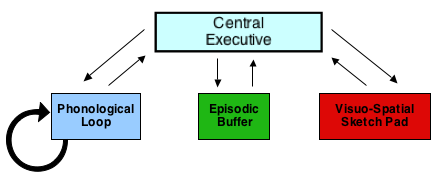I’ve been digging into research papers again, looking for ways to enhance second language acquisition. After working through a few papers and an introductory text book, I was left thinking “When are they going to get to the part about how to learn languages better?” Most of the research seems to be on the processes and issues surrounding second-language acquisition, rather than how to enhance it. So I went right back to the drawing board and started looking at the cognitive processes involves in language comprehension and production, looking for clues. I started with the phonological loop.
The phonological loop is the aspect of working memory that deals with auditory input. Loads of studies have been done on this which I won’t go into here, but one hugely important point is that the loop’s capacity is time-based. For example, memory of two syllable words is worse if they are longer (voodoo, harpoon) than if they are shorter (bishop).
Something I’m particularly interested in, is improving language comprehension. I often find that I can listen to something in Spanish, not understand it at all, but upon reading a transcript realise that I know all those words. I think the time-based limitation of the phonological loop might be a key to improving this.
If a person is speaking to you in a foreign language, you often find that although you’re focused on what they are saying, nothing makes sense. Then, they pause for a moment, and the meaning of the last few seconds of speech magically comes to you. It’s as though the brain is occupied with attending to the incoming speech, then when there’s a pause it takes the chance to process whatever’s in the phonological loop. Assuming this is true, there are a few things that might help with language comprehension:
1 – Increase the capacity of the phonological loop
The bigger this is, the more you can hear and keep in your working memory until the pause comes. I couldn’t find any research on actually improving the size of the loop’s capacity, but I’ll keep looking. Let me know if you know of any. Something to consider here is the difference between actual gains in the loop’s size versus the use of strategies to more efficiently store information within it (chunking, etc) — and how and if it is possible to distinguish between the two.
This is important because if capacity could seemingly be improved on some task via a strategy, but that strategy doesn’t transfer to languages, it’s a false friend, so to speak.
Presumably, tasks specific to comprehension would improve the capacity of the loop, that’s assuming that it can be improved at all. Maybe things like the n-back task, set to audio only, or simply listening to short speech clips and trying to repeat it back straight afterwards (ideally in the target language), could be good exercises.
2 – Ability to pay attention
I’ve noted previously that attention is key to memory, and it’s pretty clear how attention fits into this model. If you keep focused on what they are saying you’ll get more of what they say into your phonological loop for later processing. Then when the conversational pause comes, your brain has more data to transform into something meaningful.
3 – Speed of processing
Note that this only applies to words you don’t know “automatically.” If they said “Gracias” or “Merci,” or something in your native language, the meaning would come to you. So at the most basic level, there’s an issue of learning the language well and knowing the words well, preferably without having to do “real-time” translations via your native language. The more of the data in the PL that you just “know,” the more time your brain has to work on the bits it doesn’t already know, and also, it can use the words it does know to narrow down the range of possibilities (more on that later).
Phonological loop in language acquisition
Just to turn everything I’ve just said upside-down, another consideration with the phonological loop is that it’s not solely applied to language comprehension — in fact, it may not even be critical for that (except perhaps in the cases I’ve noted above, during the initial stages of learning a language where listening is an active — and draining — task!). It is strongly implicated in our ability to learn languages. For example, Gathercole and Baddeley (1989) found that a children’s performance on a word-repeating task predicted their vocabulary a year down the line. So we must be careful here not to confuse correlation with causality, because, for instance, we don’t know if changing our ability on word repeating tasks would improve our language acquisition abilities. It does seem more reasonable that this would improve our ability to comprehend language, however, for the reasons I described above.
